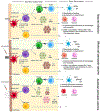Pertussis vaccines and protective immunity
- PMID: 31078081
- PMCID: PMC6774807
- DOI: 10.1016/j.coi.2019.03.006
Pertussis vaccines and protective immunity
Abstract
Despite high vaccine coverage, reported cases of pertussis have increased steadily over the last twenty years. This resurgence has stimulated interest in host responses to pertussis infection and vaccination with the goal of developing more effective next-generation vaccines and vaccination strategies. Optimal protection against Bordetella pertussis appears to be multifactorial requiring both humoral and cellular responses. Natural infection and whole-cell pertussis vaccination induce Th1 and Th17-dominated responses. In contrast, acellular vaccines induce Th2-dominated responses. Available immunological data indicate that while antibodies provide protection against disease, Th1 and Th17-mediated immune responses are required for bacterial clearance and long-lasting protection. The nature of the priming in children appears to be important in modulating bias and durability of immune responses required to provide protection against B. pertussis. This review summarizes the current understanding of differences in immune responses and their role in protection against B. pertussis following infection or vaccination.
Published by Elsevier Ltd.
Figures
References
-
- Pinto MV, Merkel TJ: Pertussis disease and transmission and host responses: insights from the baboon model of pertussis. J Infect 2017, 74 Suppl 1:S114–S119. - PubMed
-
- Lindsey B, Kampmann B, Jones C: Maternal immunization as a strategy to decrease susceptibility to infection in newborn infants. Curr Opin Infect Dis 2013, 26:248–253. - PubMed
Publication types
MeSH terms
Substances
Grants and funding
LinkOut - more resources
Full Text Sources
Other Literature Sources
Medical


